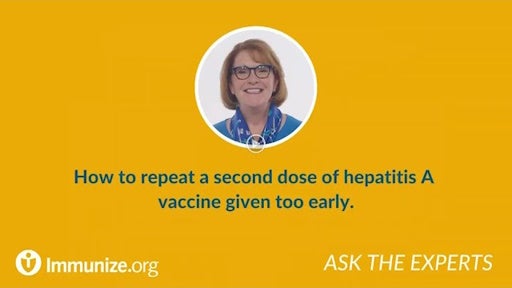In 2020, CDC published revised recommendations for hepatitis A postexposure prophylaxis (PEP). Please see the complete PEP recommendations at www.cdc.gov/mmwr/volumes/69/rr/pdfs/rr6905a1-H.pdf, with special attention to Table 4 on page 19 and Appendix B: Provider Guidance on Risk Assessment for Hepatitis A Postexposure Prophylaxis, beginning on page 36.
Healthy people who have completed the HepA vaccination series at any time do not need additional PEP if they are exposed to HAV. People who have recently been exposed to HAV and who have not received HepA vaccine previously should receive PEP as soon as possible, within 2 weeks of exposure.
People age 12 months and older exposed to HAV within the past 14 days and who have not previously completed the HepA vaccine series should receive a single dose of HepA vaccine as soon as possible. In addition to vaccine, immune globulin (IG; 0.1 mL/kg) may be administered to people older than age 40 years depending on the providers’ risk assessment. For long-term immunity, the HepA vaccine series should be completed with a second dose at least 6 months after the first dose. However, the second dose is not necessary for PEP. A second dose should not be administered sooner than 6 calendar months after the first dose, regardless of HAV exposure risk.
People age 12 months or older who are immunocompromised or have chronic liver disease, and who have been exposed to HAV within the past 14 days and have not previously completed the HepA vaccination series, should receive both IG (0.1 mL/kg) and HepA vaccine at the same visit in a different anatomic site (for example, separate limbs) as soon as possible after exposure. For long-term immunity, the HepA vaccination series should be completed with a second dose at least 6 months after the first dose. However, the second dose is not necessary for PEP. A second dose should not be administered sooner than 6 calendar months after the first dose, regardless of HAV exposure risk.
People with HIV infection develop protective levels of antibody more slowly and are less likely to develop protective antibody levels after vaccination with HepA, especially if their CD4+ count is low at the time of vaccination. Protection following vaccination of a person with HIV may wane over time. Vaccine should be administered if the exposed individual is not fully vaccinated; however, CDC also advises clinicians to consider administering IG PEP to an individual with HIV after a high-risk exposure (such as a household or sexual contact) even if the individual has been fully vaccinated.
Twinrix contains half the amount of hepatitis A antigen as a standard single-dose adult HepA vaccine. Twinrix should not be used for PEP but may be used to confer protection to at-risk but not yet exposed persons during an outbreak.
Infants younger than age 12 months and persons for whom vaccine is contraindicated should receive IG (0.1 mL/kg) instead of HepA vaccine as soon as possible and within 2 weeks of exposure. MMR and varicella vaccines should not be administered sooner than 6 months after IG administration in order to avoid possible IG interference with the effectiveness of MMR and varicella vaccines.
